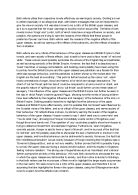How do the Writers Create Sympathy for one Character in Each Text
Golding and Hill create harsh oppressive environments that are seen to challenge and break down the characters that face them. Golding does this to Piggy in “Lord of the Flies” and Hill does this to Kingshaw “I’m The King of The Castle”. Both authors make their characters victims of the English class system, of brutal savagery and of injustice.
Golding begins to make the readers feel sympathetic quite early on in the novel by showing Piggy as a victim of the class system. He accomplishes this through the comment that the boys were a “closed circuit of sympathy with Piggy outside”. The inherent difference between Piggy and the boys makes it instantly clear to the readers that the rest of the children view Piggy as an outsider and not one of them; most likely because they see him as inferior as they come from a private school and are in the upper-class while Piggy is not.. This almost abandonment of Piggy by the others so early on in the novel really makes the reader sympathise with Piggy as he is seen as someone who is unfairly being neglected for menial reasons. Additionally, the description of the boys being a “closed circuit” almost implies that they are a group who rely on and need each other. The use of “closed” only served to further distance the gap between Piggy and the others. Golding then goes on to describe Piggy as “intimidated by the uniformed superiority” of Jack. Golding uses this sentence to show the readers Piggy’s stance on the subject of class status. Upon seeing Jack in uniform he views him as someone who is better than himself in all aspects, as evidenced by the use of “superiority”. This implies that Piggy has been brought up in an environment that emphasises the belief that some people are better than others i.e the English class system in which a nobleman was seen as better than a peasant/worker. Infact, Piggy is described as believing this so whole heartedly profoundly that he ends up being “intimidated” by Jack. This shows that upon seeing someone who is of a higher class than him, Piggy begins to feel inferior and frightened. A reaction such as this could be described as childish and serves to only further the sympathy the reader is giving to character that they view as vulnerable and discriminated against. Hill follows in a similar manner but instead of showing Kingshaw as merely separate from Hooper and having him secluded because of it, she chooses to show how the class system can lead to the subordination of individuals. Hill demonstrates this early on in the novel by having Hooper say to Kingshaw “you do what I say”. This simple phrase effectively demonstrates the mentality that Hooper, a representative of the upper class, has towards to those lower in status than him. In other words, this shows that Hooper believes that Kingshaw is of a lower stature than him and so this grants him the right to command Kingshaw. This disregard for Kingshaw and his feelings surprises the reader and antagonises Hooper; therefore making the reader sympathetic to Kingshaw as he is seen as a victim. Hill furthers this line of thinking later on when Kingshaw states that he would “acknowledge [Hooper] as master”. Not only has Hooper asserted his class dominance over Kingshaw, but now Kingshaw accepts this as the norm. This idea of Kingshaw accepting that Hooper is more powerful than him is repeated numerous times throughout the novel and shows that Kingshaw believes that there is no hope for him. Hill intentionally portraits Kingshaw as unambitious and unmotivated so that the reader can sympathise with someone who they see as unfairly victimised. What both writers demonstrate here is the class system is an outdated method and they do so by highlighting its destructive effects








